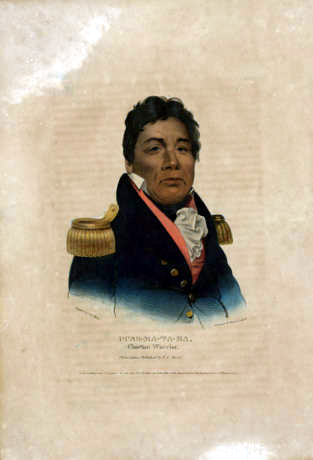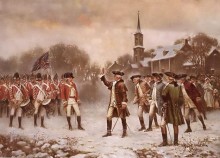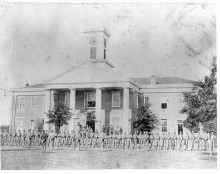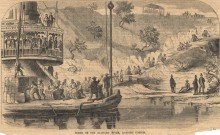Excerpt from ALABAMA FOOTPRINTS: Confrontation (Story continued below)
Pushmataha Offers Assistance
After Fort Mims was destroyed, the Red Sticks were in a high state of excitement which spread over the land. They burned homes, destroyed crops, and murdered every white man with whom they came in contact. Panic seized the whole population of the Mississippi Territory. Settlers abandoned their homesteads and fled to the confines of the forts. Three hundred and ninety people were housed at Fort Huron, at Fort Rankin were five hundred and thirty, and at Fort St. Stephens were five hundred settlers. Two forts at Mount Vernon were packed with refugees. Urgent requests for help were sent to the Governors of Louisiana, of Georgia, and of Tennessee.
The Creeks were divided into two parties after Fort Mims, the friendly Native Americans and the Red Sticks, but the war party prevailed while the other looked to the United States for protection. There was great anxiety that the Chickasaws and Choctaws would be drawn into the conflict as allies.
In southern part of what would become Alabama, settlers had quickly armed themselves. A small group of twenty-five rural pioneer Alabama militia were scouting the sparsely settled area of Wood’s Bluff and Bashi Creek in the fall of 1813 when they were ambushed by Red Sticks. They were led by Colonel William McGrew who had taken part in the Battle of Burnt Corn, to a stream called Bashi Creek which flowed into the Tombigbee River a mile or two north of Wood’s Bluff when they suddenly found themselves among concealed Creek warriors.
A turkey tail was raised above a log by one of the concealed Creek which was the signal for attack and the Native Americans began firing. Colonel McGrew was killed along with Private Edmund Miles, Jesse Griffin, and Captain William Bradbury. David Griffin (twin of Jesse Griffin) was reported missing and presumed dead; his body was never found. Days later, a military column passed by and buried the deceased pioneer militia members with military honors.
The few troops under Claiborne’s command, together with the militia of the country, were barely sufficient to hold the forts, and even this inadequate force was liable at any time to be reduced by the withdrawal of the soldiers to assist in repelling an attack of the British whose fleet now constantly threatened the coast; and if the forces of the Choctaws and Chickasaws should be added to Red Eagle’s strength, the plight of the whites would indeed be profound.
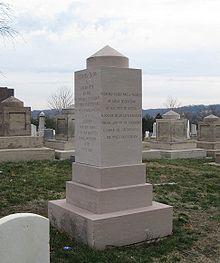
About this time a Choctaw chief of influence with his people, by name Pushmatahaw, arrived at St. Stephen’s, and declared that he could induce a considerable number of the Choctaw warriors to enlist in the American service if permission was given to recruit among them.
Eagerly grasping at this hope, Colonel George S. Gaines went with the chief to Mobile to secure the desired authority from General Flournoy, who was now in command of the southwestern department.
That officer, for some reason which is not apparent, declined to accept the services of the Choctaws and Colonel Gaines and his companion returned with heavy hearts to St. Stephen’s with the sad news. However, before Pushmatahaw had taken his departure, a courier from General Flournoy arrived with the order for Colonel Gaines to accept the friendly chief’s offer of assistance and to accompany him to the Choctaw Nation to enlist the men.
With a single white companion, Colonel Gaines went with Pushmatahaw to the nation where, gathering the Choctaws into a council, the chief made them a speech, saying that Tecumseh, who had suggested this war, was a bad man. He added:
“He came through our country, but did not turn our heads. He went among the Muscogees, and got many of them to join him. You know the Tensaw people. They were our friends. They played ball with us. They sheltered and fed us when we went to Pensacola. Where are they now? Their bodies are rotting at Sam Mims’s place. The people at St. Stephen’s are also our friends. The Muscogees intend to kill them too. They want soldiers to defend them. You can all do as you please. You are free men. I dictate to none of you; but I shall join the St. Stephen’s people. If you have a mind to follow me, I will lead you to glory and to victory.”
Pushmatahaw finished this speech with his drawn sword in his hand. When he paused, one of the silent warriors stood up and, striking his breast with his open palm, after the manner of the Choctaws on specially solemn occasions, said, ” I am a man; I will follow you.” Whereupon his fellows imitated his example, and thus a considerable force of men, who might have been added to Weatherford’s strength but for the friendliness of Pushmatahaw, became active friends of the whites.
During this time before railroads and steamboats, it took more than a month for the swiftest messenger from Alabama to reach New York. In this perilous situation of affairs it was useless for General Claiborne, or his superior officer, General Flournoy, to appeal to the government at Washington for aid. Even if the troops of the Government had not been fully occupied already in other parts of the country, the distance was so great that any assistance which the general government might be able to render must of necessity come too late to be of any avail. It would take a month for the messenger asking for help to reach Washington, another month for a force to be gathered, and perhaps two months more for it to reach the exposed point. Three or four months at least, and probably a greater time, must pass before help could come from that quarter, and it might as well have taken a hundred years so far as all practical purposes were concerned.
Therefore, the only sure resource was an appeal to the people of the surrounding states. Urgent requests for help were sent to the Governors in South Carolina, Georgia, and Tennessee, carrying dispatches which simply set forth the facts and the danger. The response was quick and generous. Georgians and South Carolinians began at once to organize forces, which soon afterward invaded the Creek country. But the most efficient aid was to come from Tennessee, a state which had already shown itself quick to answer to every demand made upon it.
Tennessee had furnished its full quotas of men to the national army; and in less than a year it had sent a full division of volunteers under Jackson to reinforce the army at New Orleans. This division had been ordered to disband while at Natchez, when they were without money or provisions with which to reach their homes, but Jackson had resolutely disobeyed the order, and instead of disbanding his division had marched it back to Tennessee in a body.
Meanwhile, the Red Sticks war party had gathered a formidable body in early October and were said to have been directing their course towards the frontiers of Tennessee.
ALABAMA FOOTPRINTS Confrontation: Lost & Forgotten Stories (Volume 4
is a collection of lost and forgotten stories that reveals why and how the confrontation between the Native American population and settlers developed into the Creek-Indian War as well as stories of the bravery and heroism of participants from both sides.
Some stores include:
- Tecumseh Causes Earthquake
- Terrified Settlers Abandon Farms
- Survivor Stories From Fort Mims Massacre
- Hillabee Massacre
- Threat of Starvation Men Turn To Mutiny
- Red Eagle After The War


